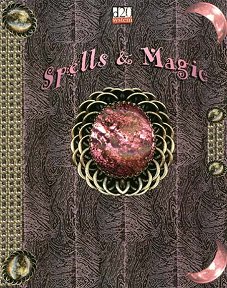
Magic is fundamental to fantasy, states the Introduction, the one thing that takes the genre beyond some imaginary mediaeval world into the genre we know and love. It is not just the preserve of the spell-using classes, all character classes in some way make use of magic during their adventuring lives. Magic of itself is, like fire, neither good nor evil; it all depends on the uses to which it is put.
In this work you will find a collection of new feats and spells, prestige classes and magic items. There are also chapters on novel ways to practise magic: blood magic, dragon magic, faery magic, mirror magic, jewel magic, rune magic, the Path of Shades (not quite as dodgy as it sounds), the Spellsinger, and totem magic. Whilst certain classes may be more suited to a give sphere of magic, and its associated prestige class, there's definitely something for everyone here.
First up, the new feats. They've been collected from the prestige classes discussed later on, but many already have a broader application, or wouldn't need much modification to allow for more general use. Some are quite dramatic. The Blood Power Metamagic Feat enables a spellcaster to power spells by taking damage themselves, whilst Eye of Knowledge confers extra information about the runes... at the cost of plucking out your own eye! There is also a delightful section of new uses for old skills. Alchemists making gems look more expensive indeed!
Chapter 2: Blood Magic introduces this method of powering spells by the caster's own life force. It's a dangerous art to practice, even if it does let you cast more spells than equivalent practitioners of other paths. There's a prestige class that lays it all out, depicting the blood mage as a spellcaster that makes others a bit uneasy... and revealing that some prefer to use someone else's blood rather than their own to power their magic. Most people would regard that as an evil act, especially if the other person isn't willing. However, if the whole concept is making you feel a bit quesy, actual bloodletting does not appear to be part of the process, it's really life-force that is being used and, mechanically-speaking, hit points that are lost.
Next, Chapter 3: Dragon Magic looks at how to tap into dragons' legendary magic prowess. Dragons are fascinated by magic, in particular the underlying concepts that make magic 'work'. Apparently part of this involves the energy between a person and an item they love, and this leads to an explanation of why dragons amass hoards. They created the Trovebond Ritual to tap into this, drawing on the inherent power of possessing a hoard to create the magics that protect that hoard. These skills are not limited to dragons alone, anyone can practise dragon magic if they have the patience to learn. Just about anyone can take the Dragon Mage prestige class as long as they have the ability to cast spells, all they need do to begin with is discover the Trovebond and start amassing a hoard.
More types of magic, each with an engrossing backstory and a detailed prestige class for those choosing that path, follow. Some study the natural and powerful magic of the fey, becoming known as faeriers. Others harness the magic of mirrors or of gems - but this is no simple matter of harnessing the inherent power of mirrors or gems, but a complex series of manipulations to create astonishing effects. The possibilities are endless, the potentials fantastic, as we're swept through rune magic with its ancient traditions (including a detailed run-down of all the runes) - and including suggestions for running a game where rune magic is the only source of magic, should you so wish. Then there's the Path of Shades, not necessarily evil but fairly dodgy however good your intentions are... no dealings with the undead can be completely pure.
Spellsinging is a lot nicer, harnessing the power of song. It's a favourite specialisation of bards, of course, but sorcerers, wizards and rogues (provided they have some musical training) can also become Spellsingers. Naturally, the one thing they dread is a silence spell! Totem Mages get back to nature, forging links with a spirit guide or totem creature, and it's a practice popular with druids and rangers, especially as you need to be able to assume the form of your totem creature. Abilities vary according to the animal adopted as a totem, so choose wisely.
A vast spell list and a collection of magic items wind up this fascinating tome, which is excellent for anyone interested in digging into magic theory and finding new ways to practice the stuff of fantasy.
Return to Spells and Magic page.
Reviewed: 20 August 2019

